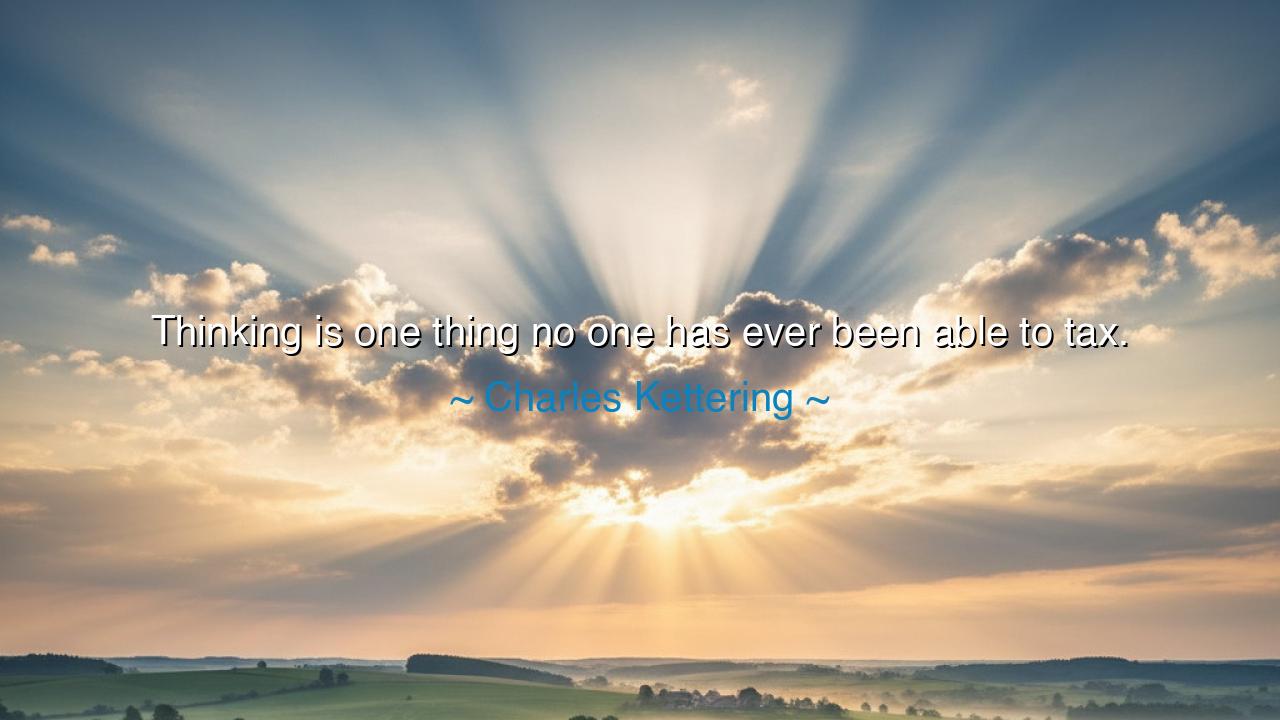
Thinking is one thing no one has ever been able to tax.






In the vast river of human progress, where great empires rise and fall, and where the forces of society and government exert their power over the masses, there is one domain that has always remained free—the realm of thought. Charles Kettering, a visionary inventor and engineer, encapsulates this truth with his simple yet profound words: "Thinking is one thing no one has ever been able to tax." With these words, Kettering speaks to the very essence of human freedom and creativity, revealing that despite all the controls and restrictions placed upon us, the mind remains untouchable—a sacred space where ideas, innovation, and imagination are boundless.
The ancients understood the power of thought and reason. Socrates, perhaps the greatest philosopher of ancient Greece, knew that the ability to think and question was not just a privilege—it was a fundamental right. In his teachings, he encouraged his students to examine their beliefs, to challenge the assumptions that governed their lives. For Socrates, thought was the most sacred of human faculties, and it could not be controlled or taxed by the state. His philosophical methods—interrogation, dialogue, and reasoning—were tools that allowed the individual to break free from the chains of ignorance. Just as Kettering suggests, thought cannot be seized by the hands of any ruler, for it is a domain beyond control.
Similarly, the Romans placed great value on the mind and its capacity to influence the world. Cicero, the great Roman orator, believed that rhetoric—the art of persuasion through thought and speech—was one of the most powerful tools at a citizen’s disposal. Yet, even in the heights of Roman power, the Roman Empire could not regulate or dictate the thoughts of its people. While the empire could levy taxes on goods and services, it could never tax the ideas that took root in the hearts of the people. This was the domain of the philosopher, the poet, the thinker, who, despite the great political power of Rome, could express freely, and whose ideas could inspire revolutions, shape societies, and alter the course of history.
Consider the story of Galileo Galilei, who, with his revolutionary theories about the heliocentric model of the solar system, defied both the church and the state. At a time when thought was heavily controlled, Galileo dared to challenge the dogma of his time. He did not possess vast wealth or political power, yet through the power of his reason and inquiry, he unlocked truths that would change the world forever. The church could impose penalties and punishments, but it could not control Galileo’s thoughts. The lesson here is profound—though the church and state may attempt to control the bodies of men, they cannot touch the thoughts that shape their destinies.
Kettering's words are also a powerful reminder of the power of individuality in an age where external forces try to dictate every aspect of our lives. In our modern world, where technology, social media, and mass media often create pressures to conform, we must remember that thinking—true, independent thinking—remains the ultimate act of freedom. The mind is a space that cannot be taxed, and it is through our thoughts that we can shape our futures. Like Socrates, who questioned the norms of his time, and like Galileo, who challenged the established truths of the world, we too must dare to think beyond the boundaries that society sets for us.
The lesson of Kettering’s quote is one of empowerment and responsibility. It calls on us to guard our ability to think freely, for it is in this domain that true freedom resides. In a world that often seems overwhelmed by external pressures—whether financial, political, or societal—our ability to question, to reflect, and to create remains unassailable. Let us take up the mantle of the great thinkers of the past, understanding that our most powerful tool is not found in material wealth or political influence, but in the freedom of our thoughts.
As we go about our lives, let us nurture our minds, expand our thinking, and question the assumptions that others seek to impose on us. Let us remember that even in times of adversity or oppression, our thoughts are our own, and they are the seeds from which change grows. The most profound revolutions in history began with a single thought, a single question, and a willingness to challenge the world as it is. In this, we find our truest power: the ability to think, to imagine, and to transform the world around us. Just as Socrates, Galileo, and others have done, we must continue to defend the sanctity of our thoughts, for they are the gateway to true freedom and the key to shaping the future.






AAdministratorAdministrator
Welcome, honored guests. Please leave a comment, we will respond soon